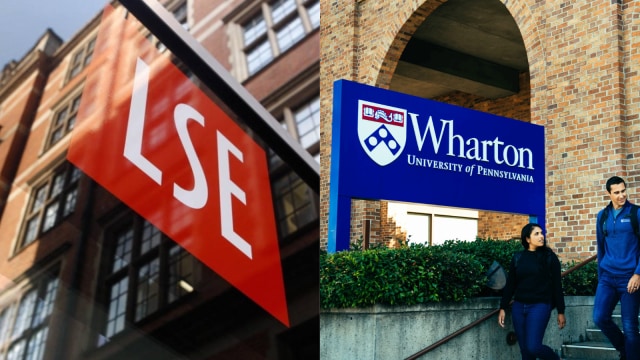London School of Economics Vs Wharton School: Courses, careers, & costs
Both institutions command international prestige. LSE is recognised worldwide as a hub of economic thought and public policy research, while Wharton has built its reputation as the leading school for business and finance education.
 LSE vs Wharton School- All you need to know about courses, costs and more (Images via official websites)
LSE vs Wharton School- All you need to know about courses, costs and more (Images via official websites)—Anantya Dube
New York City and London stand as twin capitals of global finance, powered by legions of graduates and professionals in economics, business, and finance. Yet, among this vast talent pool, two institutions consistently rise above the rest. For generations, the Wharton School at the University of Pennsylvania (Penn) and the London School of Economics (LSE) have trained the economists, financiers, and policymakers who set the pace of global markets. Wharton counts among its alumni household names such as Sundar Pichai, CEO of Alphabet and Google; Anil Ambani, Chairman of Reliance Group; and Ruth Porat, Chief Financial Officer of Alphabet and former Morgan Stanley CFO. Similarly, LSE has produced distinguished figures including Kaushik Basu, former Chief Economist of the World Bank and Chief Economic Adviser to the Government of India; Raghuram Rajan, former Governor of the Reserve Bank of India and former Chief Economist of the IMF; and George Soros, investor, hedge fund manager, and philanthropist.
Over 7.6 lakh Indians went abroad for higher studies in 2024: Govt
Both institutions command international prestige. LSE is recognised worldwide as a hub of economic thought and public policy research, while Wharton has built its reputation as the leading school for business and finance education. For ambitious Indian students, comparing these flagship programmes provides clarity on which path can best unlock their future potential. One offers a rigorous immersion into theory and public policy rooted in London, while the other provides a launchpad into business and finance from the heart of the Ivy League in Philadelphia.
Chevening Scholarship & Fellowship 2025 Application: Know eligibility, deadline & financial assistance
Admission is fiercely competitive with Penn’s undergraduate admissions rate hovering near 5% and LSE’s flagship economics programmes receiving thousands of applications across countries each year. The payoff is transformative with graduates of Wharton reporting average starting salaries above $175,000 and LSE economics and finance graduates frequently stepping into roles at global institutions such as the IMF, World Bank, and top investment banks. LSE also ranks consistently among the top 5 universities worldwide for social sciences and economics, and more than 70% of its students come from outside the UK, creating an exceptionally international peer network.
Location and global advantage
LSE is situated in the heart of London, steps away from the financial district, Parliament, and leading global organisations. Its proximity to the Bank of England, the London Stock Exchange, major law firms, and policy think tanks places students at the centre of global decision-making. This setting offers unparalleled access to guest lectures, internships, and networking opportunities embedded in the city’s professional ecosystem. The campus is also exceptionally well connected, within walking distance of Holborn and Temple underground stations, which link directly to Heathrow Airport, while Gatwick, Luton, and Stansted are reachable in about 90 minutes by public transport. With landmarks like the British Museum, the National Gallery, and Covent Garden nearby, and surrounded by London’s theatre district and diverse food options, LSE offers both academic and cultural immersion at the city’s core.
What’s the average cost of living in Germany for students?
Wharton’s home is Philadelphia, a city rich with history and entrepreneurial energy, but its reach naturally extends to New York, the beating heart of global finance. For many students, the rhythm of their Wharton journey includes weekends or summers in Manhattan, pursuing internships, attending networking events, and building connections only a short train ride away. This combination of an Ivy League education rooted in Philadelphia’s vibrant academic community and close proximity to New York’s financial ecosystem creates a launchpad for ambitious careers in finance, consulting, and entrepreneurship.
Admission process
At the London School of Economics, the admissions journey is defined by intellectual rigour and a truly global competition. For Indian students, this often means presenting exceptional academic records, typically around 95% or above in the CBSE or ISC boards, a score of 37+ in the International Baccalaureate with higher-level mathematics, or at least one A* in A-Levels alongside strong grades in relevant subjects. Yet numbers alone are not enough. A personal statement that captures a student’s curiosity, ambition, and ability to think beyond the classroom often becomes the differentiator.
Students applying to economics and mathematics-related courses are also required to sit the Test of Mathematics for University Admission (TMUA), which assesses problem-solving and reasoning skills beyond standard curricula. Economics, one of LSE’s flagship programmes, is notoriously selective, with reports placing acceptance at only about five to seven percent, which speaks to the school’s reputation as a training ground for some of the brightest economic minds worldwide.
Wharton takes a different approach, following the holistic tradition of the Ivy League. Admissions are shaped as much by stories as by scores, essays, recommendations, leadership and extracurricular pursuits alongside academic achievement. As a school within the University of Pennsylvania, it falls under Penn’s undergraduate admissions framework, where the SAT remains mandatory. Typically admitted students have an average SAT score of 1528, and place among the top one to two percent of their graduating class. While holistic admissions are a factor, strong academics remain non-negotiable for international students.
As US tightens student visas, countries in Asia, UK see enrollment surge
In addition to academic performance, universities look for evidence of interest, intellect, and ability in the area a student wishes to study. For those targeting economics or finance, this could mean conducting independent research, gaining experience in investment or business clubs, interning with financial organisations, managing small funds, or even working on financial literacy initiatives.
The process is designed to identify not only sharp analytical thinkers but also future leaders who will leave a mark on business and society. Though the school does not publish programme-specific figures, estimates suggest that fewer than five percent of applicants gain admission, reinforcing Wharton’s standing as one of the most selective business schools in the world
Professional outcomes
LSE graduates often move into roles in academia, international organisations, and government policy. Alumni occupy influential positions at Deloitte, J.P. Morgan, Barclays, EY & More. According to LSE’s own career outcomes survey, more than 90% of its graduates are employed or in further study within 15 months, with strong placement in consulting, economics, and finance.
Wharton graduates often rise to leadership positions in finance and top U.S. and global corporations. Graduates often step straight into roles in consulting, finance, and technology, commanding starting packages that average around $175,000. It is less of a first job and more of a launchpad, setting them on trajectories that lead quickly into the upper echelons of global finance and business.
Research and collaboration
LSE is recognised globally for research that shapes both theory and policy. Its scholars drive debates in areas such as Health Policy, inequality, Environment and Climate Change and econometrics and more, often informing governments, multilateral institutions, and NGOs. Flagship centres like the Centre for Economic Performance (CEP) and the International Growth Centre (IGC) extend LSE’s reach, producing evidence-based insights that influence public policy across the world
Wharton, on the other hand, is known for applied research that connects directly to business practice. Its faculty lead pioneering work in fields such as Health Economics, behavioural economics, AI & Analytics and more, ensuring research findings are translated into industry impact. Centres like the Wharton Risk Management and Decision Processes Center and the Wharton FinTech Initiative provide students with hands-on opportunities to collaborate on projects that bridge academia and the financial sector
Curriculum
At the undergraduate level, LSE’s BSc in Economics is a three-year programme that builds a strong foundation in microeconomics, macroeconomics, and econometrics. With limited electives, students specialise early, making it a strong choice for those drawn to academic research, policy analysis, or technical roles in economics and finance. At the postgraduate level, the LSE MSc in Economics is an intensive one-year programme designed for analytical depth. It starts with an Introductory Course in Mathematics and Statistics in August, covering optimisation, dynamic programming, fixed-point theory, probability, and statistics. Students then move on to core courses in economic theory and econometrics covering micro, macro, and quantitative methods with strong mathematical support, preparing them for careers in central banking, economic consultancy, policy analysis, or doctoral study.
At the undergraduate level, Wharton’s BSc in Economics offers a four-year curriculum that blends business fundamentals with liberal arts flexibility. Students complete 37 course units, with roughly 24% drawn from Penn’s arts and sciences and other schools enabling exploration across disciplines while specializing in fields like Finance, Behavioral Economics, Entrepreneurship, or Business Economics & Public Policy. At the graduate level, Wharton’s MBA with a BEPP(Business Economics and Public Policy) concentration lets students take a core business curriculum followed by four course units in BEPP. These electives cover areas such as market structure, risk, public finance, energy, and behavioral economics. This setup is ideal for those aiming to lead in consulting, policy, or sectors where business and public policy intersect
Why it matters for students
For students aiming for careers in public policy, economic research, or global governance, LSE offers credibility, rigorous intellectual training, and unmatched policy networks. Its connections to institutions such as the International Monetary Fund, World Bank, European Central Bank, and central banks worldwide give graduates a head start in shaping global policy.
For those aspiring to leadership in finance, entrepreneurship, or strategy, Wharton provides a powerful springboard. The school’s reputation and global alumni network are reinforced by career outcomes, with top employers such as Goldman Sachs, Morgan Stanley, Bain & Company, McKinsey & Company, and Amazon consistently hiring Wharton graduates. Its placement performance makes it one of the strongest launchpads for students targeting roles in global corporate and financial sectors.
Both institutions offer unmatched credibility and opportunity; the choice ultimately lies in whether one seeks to leave a mark on global policy or on the world of business and finance.
The author is Lead at Athena Education






- 01
- 02
- 03
- 04
- 05

























